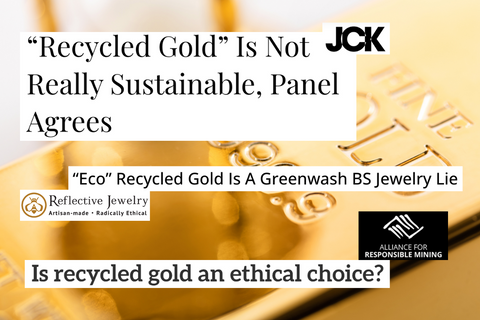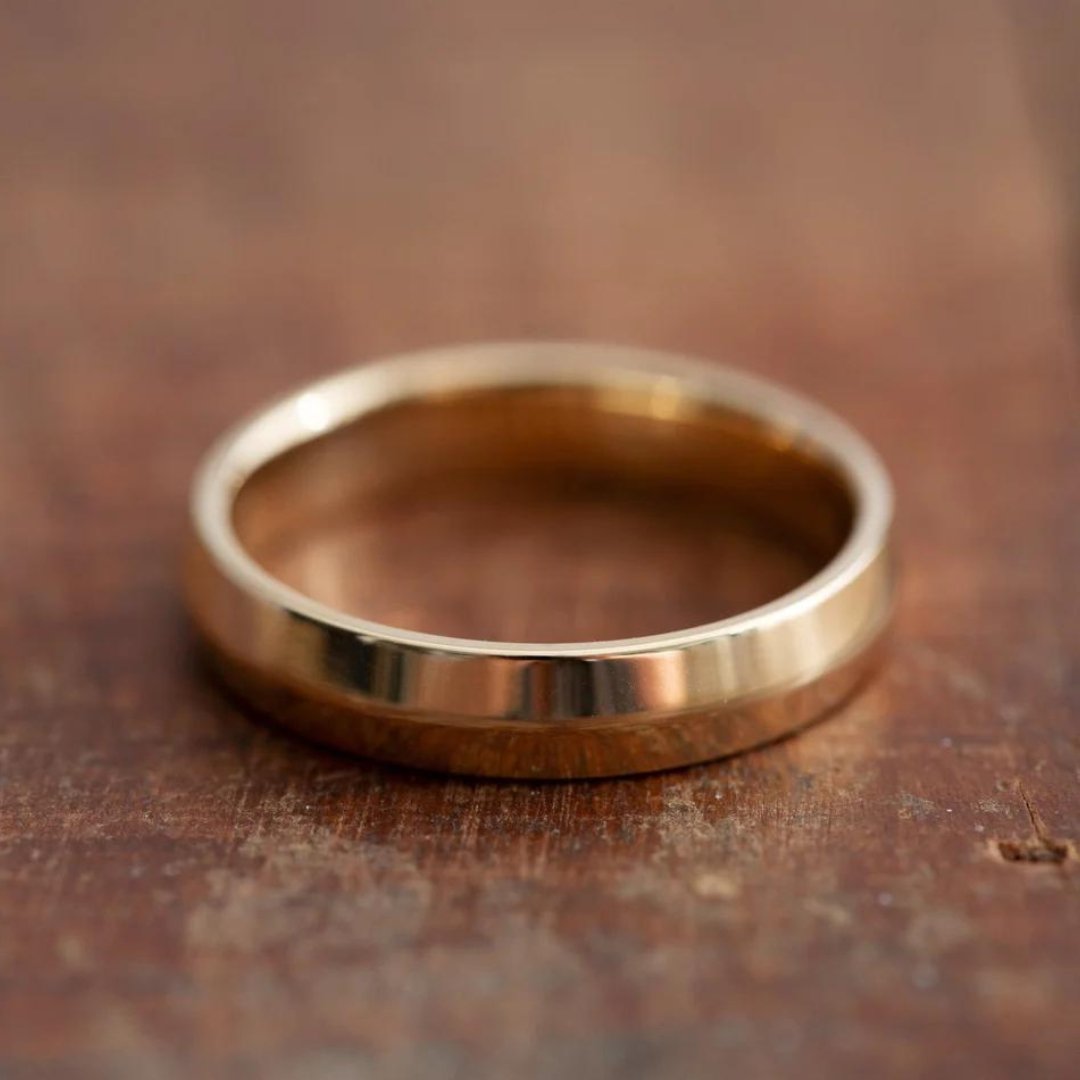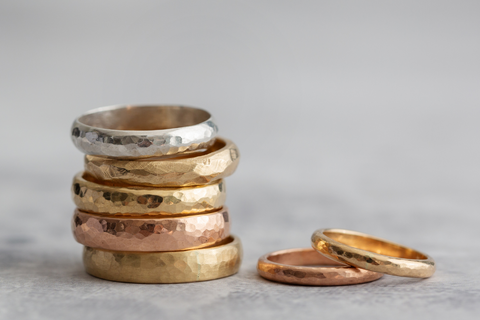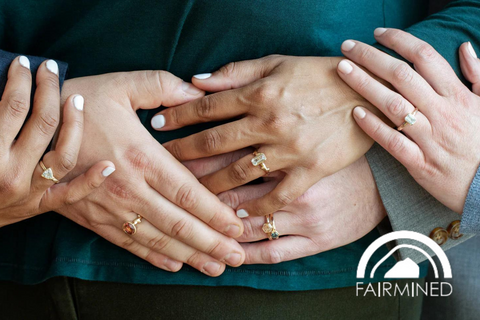Greetings, ethical jewelry enthusiasts! Today, we delve into a topic that's been buzzing around the jewelry industry - recycled gold. While recycled gold may sound like a promising and “sustainable” choice, there's a catch that most jewelry lovers aren't aware of. In this article, we'll unravel the truth behind the "recycled gold" label, exploring why it might not be as environmentally conscious as it seems. We will also help guide you to more ethical options for buying gold that is mined transparently, with minimized environmental impact, and increased social benefit.
The Myth of Post-Consumer Recycled Gold:
When we hear the term "recycled gold," most of us envision a beautiful process where old jewelry is melted down and transformed into new, stunning pieces. In this idealized scenario, choosing recycled gold would alleviate the environmental impact of new mining by circumventing the entire system. However, the reality might surprise you. The majority of gold labeled as "recycled" has actually never reached a consumer at all. Instead, it is often newly-mined gold that has never left the pre-consumer supply chain.
What does this mean? Essentially, it's not the recycled gold you might picture from your old, broken necklaces, dated rings, or retired electronics. Rather, it's gold that never made it into a finished product and often hasn’t ever reached the consumer market. This distinction is crucial as it challenges the assumption that choosing recycled gold is a straightforward way to reduce the environmental impact related to mining.
The Rebranding Game:
So, where does this pre-consumer recycled gold come from? Unfortunately, it's often newly mined gold that undergoes a process of rebranding throughout the supply chain. For example, a refiner might buy newly mined gold from various sources, smelt the gold together again, and resell the gold as “recycled.” This means that the gold labeled as "recycled" might not be any different from conventionally mined gold, and layers of redefinition obscure its journey from mine to market. By buying gold labeled as “recycled,” jewelry wearers are supporting conventional mining, which is well known to cause both environmental and social harm.
This lack of transparency raises concerns about the true origins of the gold in your jewelry. Without a clear understanding of the supply chain, it becomes challenging for jewelry lovers to make informed decisions about the ethical and environmental impact of their purchases. This means that even unknowingly, sustainably-minded jewelry businesses and wearers who buy recycled gold may be supporting harmful and toxic practices typical of much conventional gold mining.

A Call for Transparency:
In an industry that is gradually awakening to the importance of ethical sourcing, transparency is key. As consumers and business owners, we have the right to know where our jewelry comes from and the impact it has on people and the planet. The current practice of rebranding newly mined gold as "recycled" falls short of this expectation.
Recycling gold is actually nothing new, as nobody discards gold due to its high value, so it is totally different from materials like aluminum and paper that if not recycled would be discarded It is therefore highly misleading to advertise “recycled gold” as any kind of higher environmental or social standard for jewelry. Buying “recycled gold” with an untraceable origin is in fact quite unethical as it does not bring progress and development to a mining sector that will not disappear and needs the support of the market to foster sustainability and environmental responsibility. In most cases, labeling gold jewelry as made from “recycled gold” is actually greenwashing, and is simply a lie.
Choosing Responsible Gold Alternatives:
So, what can we do to support ethical gold mining and make a positive impact through our jewelry choices? The answer lies in supporting responsible, transparent sources that directly benefit mining communities. One such initiative that stands out is Fairmined certified gold.
Fairmined certification guarantees that the gold has been responsibly mined, providing fair wages to workers and adhering to environmentally sustainable practices. By choosing Fairmined certified gold, you can be confident that your jewelry is not contributing to environmental degradation or unethical labor practices. It is important to help miners who are operating responsibly because this will help bring these more ethical practices to a larger scale. This can push the industry forward as a whole, rather than letting the harmful status quo continue by tricking consumers with misleading terms like “recycled gold.”
It is also true that jewelers are in fact able to melt and repurpose heirloom jewelry to create new pieces using gold that is truly “recycled.” In this case, the jeweler should be able to clearly explain their process, including giving information about whether any additional gold is needed for the project (this is usually the case), and where that additional gold originates from. If a jeweler is averse to answering questions about the origins of their metal beyond the refiner level, then you can’t be confident that the gold in your jewelry was mined ethically or responsibly. It is important to remember that most gold labeled as “recycled” is not actually coming from these heirloom jewelry pieces, but rather from unknown sources (often newly mined gold that has never reached a consumer).
The Big Takeaways about Recycled Gold Jewelry
In conclusion, the term "recycled gold" usually isn't really what it seems. The jewelry industry's current practice of labeling pre-consumer recycled gold as an environmentally friendly option is greenwashing and is highly misleading. This system highlights the need for increased transparency and consumer awareness about the origins of their jewelry.
If you're passionate about making ethical choices, consider shifting your focus to sources like Fairmined certified gold. By supporting jewelers (like us here at W.R. Metalarts) who prioritize fair labor practices and environmentally sustainable methods, you contribute to positive change within the jewelry industry. Together, we can make informed decisions that align with our values and create a more transparent and responsible marketplace for beautiful, meaningful jewelry.
Shop our W.R. Metalarts Fairmined gold jewelry collection, and reach out to studio@wrmetalarts.com with any questions about how we source our metals transparently at W.R. Metalarts.




